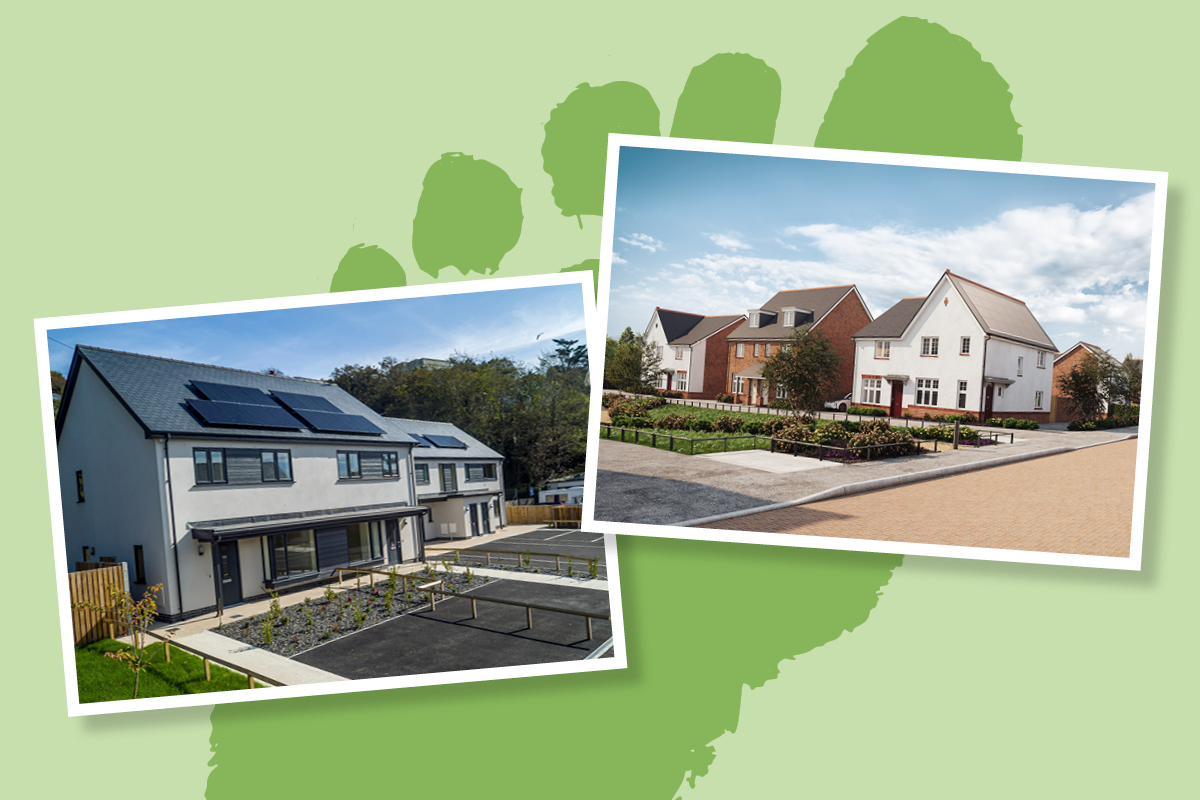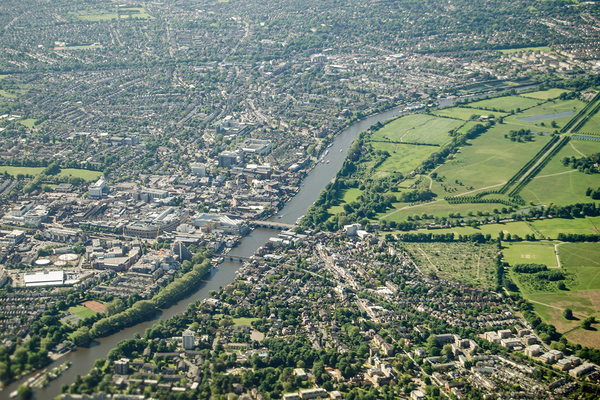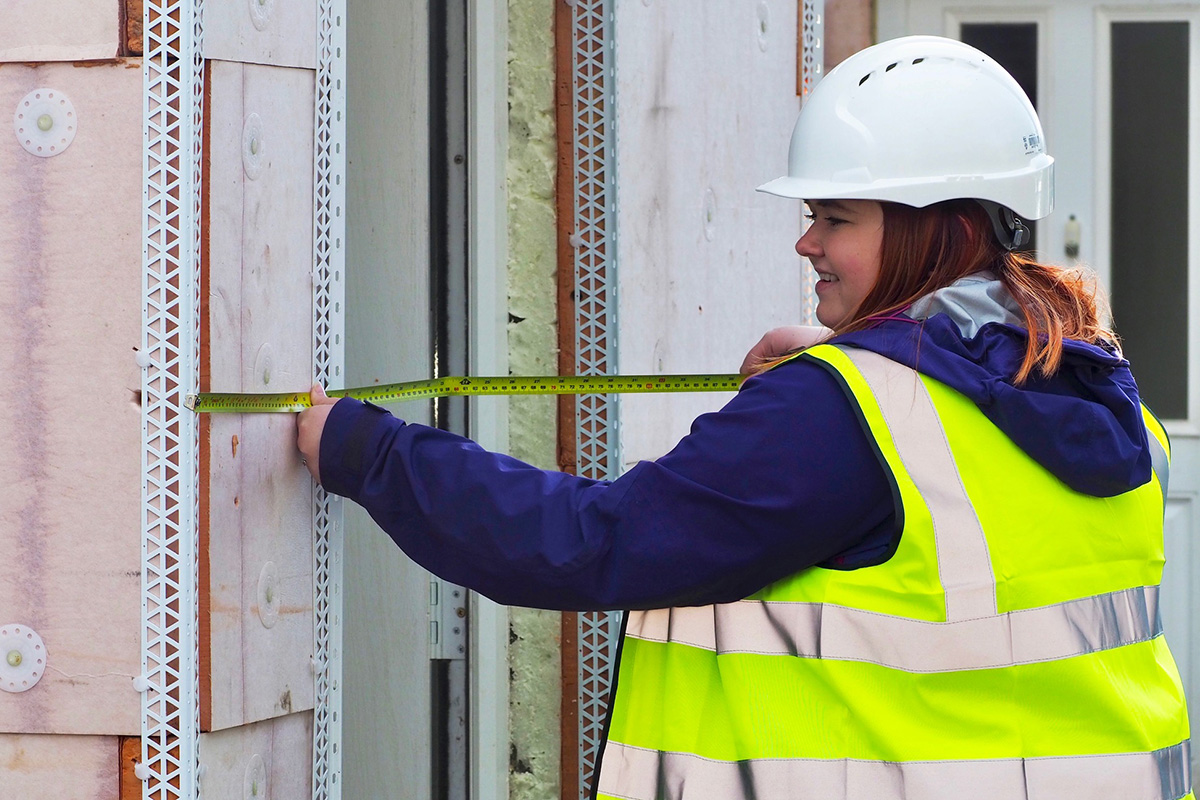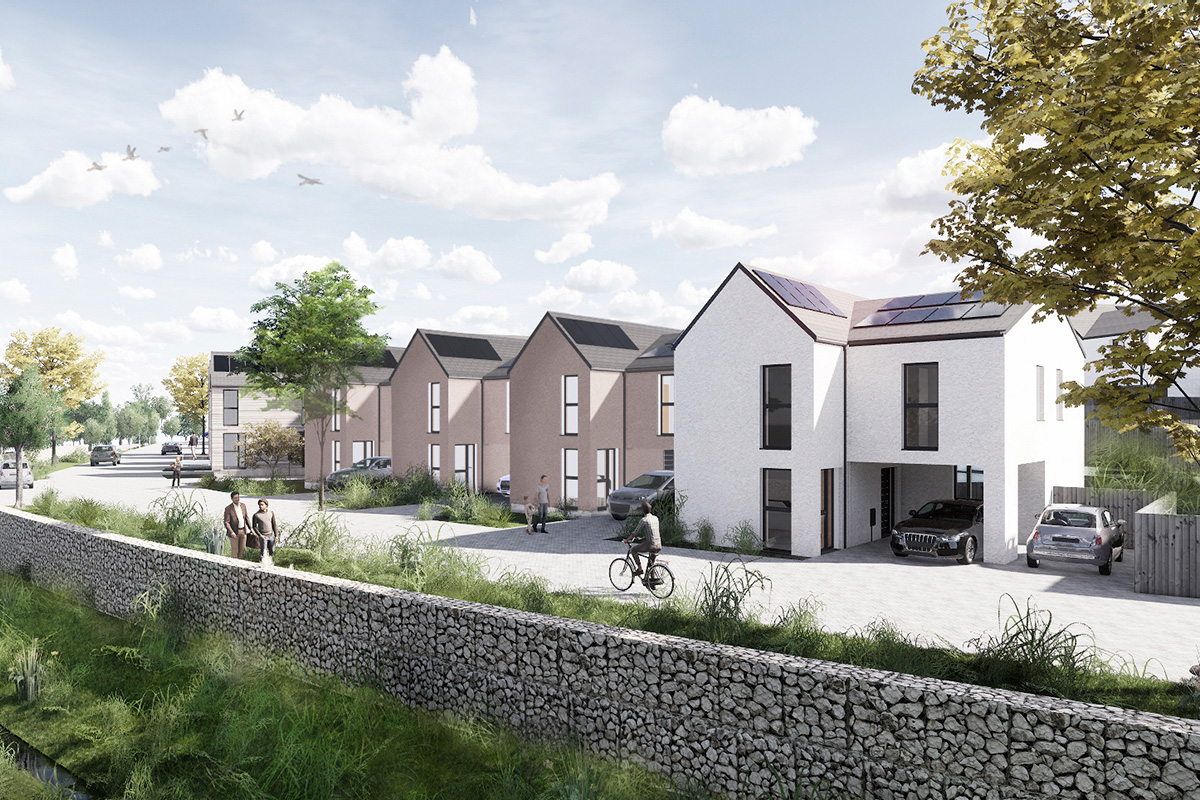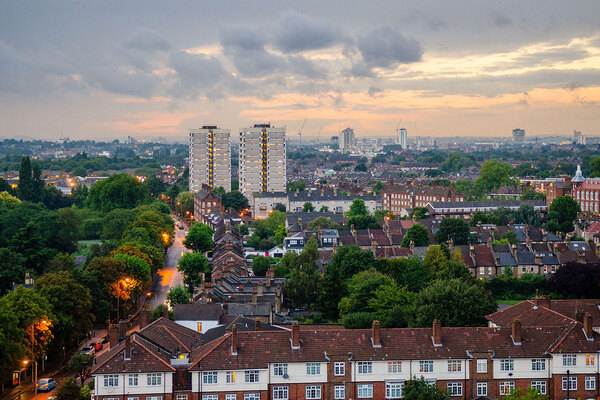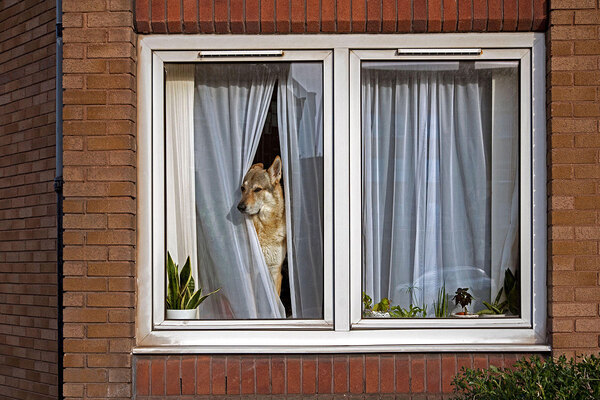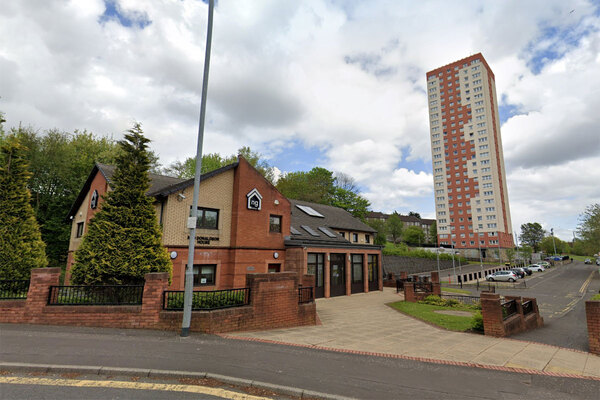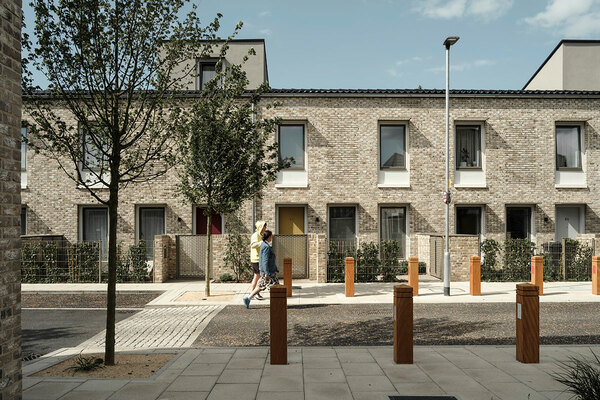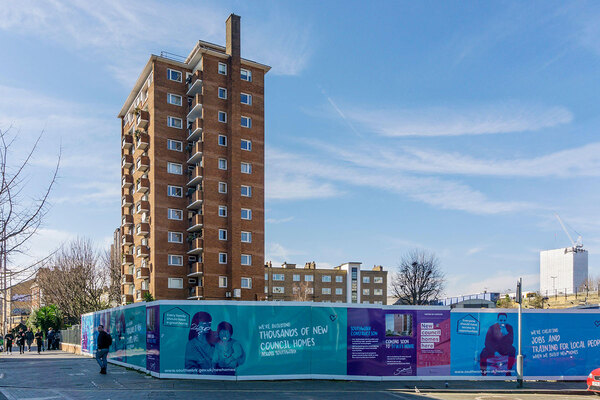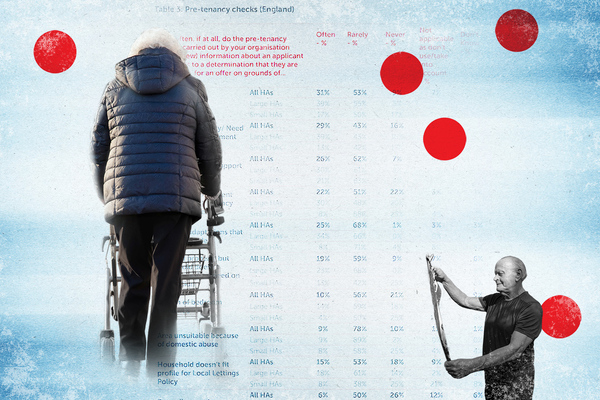You are viewing 1 of your 1 free articles
A plan for a greener Wales
The UK’s deadline to cut carbon emissions to zero is 2050. But Wales has set itself an earlier target of 2030.
Gavriel Hollander finds out what that means in practice for social landlords
Left: Properties were built with solar panels at Adra’s Parc yr Ysgol development in Aberdyfi. Right: Homes on the Parc Eirin scheme built by Pobl are heated by ground source heat pumps, not gas boilers
Devolution has been in the news recently. As the response to the coronavirus pandemic from Holyrood or the Senedd at times diverges significantly to Westminster’s, the power of the devolved nations to forge their own path on policy has never been clearer.
Down the M4, this has found expression in the Welsh government’s answer to the other great existential threat of our time: the climate crisis.
While the UK as a whole has been set a legally binding target of achieving net-zero greenhouse gas emissions by 2050, in Wales the ambition is to “achieve a net-zero-carbon public sector” 20 years earlier.
The UK’s ageing housing stock makes it one of the most difficult elements of any decarbonisation plan, and that is particularly true in Wales. A 2019 review by a government advisory group on how to achieve net zero, called Better Homes, Better Wales, Better World described the stock in the country as “some of the oldest and least thermally efficient… in the UK”, with just 10% of the country’s current stock of homes built in the previous 18 years.
“We feel that 2050 is too late. There’s a burning platform now, and if you set your target as 2040, how much will you get done by 2030?”
Unsurprisingly, Welsh homes also have lower energy efficiency, with the average home achieving the equivalent of Energy Performance Certificate (EPC) Rating D. Consequently, Welsh households are more likely to find themselves in fuel poverty.
The report recommends that all new homes in Wales be built to EPC Rating A by 2025, and all new affordable homes to achieve that standard this year. But as the report makes clear, the real challenge is retrofit. It estimates that retrofitting “socially owned and fuel-poor homes in Wales” will cost between £500m and £1bn per year over the next decade.
It is against this backdrop that housing associations in Wales are working to achieve net zero, and some are taking 2030, rather than 2050, as the target.
“We feel that 2050 is too late,” says Sarah Schofield, director of customers and communities at Gwynedd-based association Adra. “There’s a burning platform now, and if you set your target as 2040, how much will you get done by 2030?”
Last year, Adra, North Wales’ largest social housing provider, outlined plans to retrofit all of its 6,300 homes at an estimated cost of £120m, with support from the Welsh government’s £90m-a-year Innovative Housing Programme (IHP). But there is no getting away from how hard this target is for an organisation such as Adra.
“The scale of challenge is more significant because we have a broad rural area and a large amount of our homes are older, transferred stock from Gwynedd Council,” continues Ms Schofield. In fact, 79% of Adra’s stock is at least 50 years old, while more than a third dates back to at least 1945.
On the surface, it seems like Welsh housing associations not only have a more testing net-zero target than their English counterparts, but are also starting from further behind the curve.
However, the Welsh government has shown a genuine commitment to helping, with myriad programmes and funding streams available to help the retrofitting and decarbonisation agendas. Although the money available does not come close to matching the expected bill, an emphasis on collaboration and innovation is intended to do some of the heavy lifting.
“We’re all working on different types of properties, so when the results come in there will be enough different types of work to be able to identify what is the most efficient work and what order it should be done”
The Optimised Retrofit Programme (ORP) is an example of how a little money could go a long way. The £20m Welsh government programme is intended to seed fund collaborative projects, bringing together housing associations and councils to trial retrofit solutions. In November last year, a nationwide consortium run by Sero Homes and featuring 26 social housing providers, including Adra, was awarded £7m of this funding to deliver decarbonisation solutions to more than 1,300 ‘pathfinder’ homes.
Adra installing insulation panels to some of its retrofitted homes at Bryn Llwyd, Bangor
Adra has only 50 homes in the scheme but, as Ms Schofield explains, the idea is to look at “the whole life of a property” to come up with a bespoke “passport to decarbonisation”. By applying different technologies to different properties and seeing how these work, the participating landlords will develop the best solution for their own stock.
“We are learning as everyone learns and pooling that knowledge,” Ms Schofield adds. “We’re all working on different types of properties, so when the results come in there will be enough different types of work to be able to identify what is the most efficient work and what order it should be done.”
But what about new build? Although the bulk of the challenge for Wales is about retrofitting, does the extra spending that housing associations, such as Adra, are committing to updating old stock mean that new development has to take a back seat?
That does not seem to be the case for Wales’ largest social landlord, Pobl. The 16,000-home association has plans to build 10,000 more homes over 10 years, up from the 600 a year it has managed over the past five. That commitment comes alongside a pledge to retrofit its existing stock by 2030 at a cost of around £300m.
Again, collaboration seems to be at the heart of how Pobl hopes to achieve these duel ambitions.
At Parc Eirin – a project to build 225 homes in Rhondda Cynon Taf, supported by a £7m grant from the IHP – Pobl is working with Sero Energy and Tirion Homes to build properties that will be gas free and instead use battery storage, solar photovoltaic panels and ground source heat pumps.
Elfed Roberts, head of sustainability and innovation at Pobl, says that building homes to higher energy standards can add anything from £20,000 to £40,000 to the cost of a home. But he explains that knowing the standard and specifications early on and working with partners to that level can reduce the financial impact.
“It’s about getting the benefits of working with a manufacturer from the first stages of the design process, so we end up with a house type that the manufacturer can build at an affordable commercial price but still meets our decarbonisation targets.”
In numbers
10%
Proportion of homes in Wales built in the past 18 years
2025
Date that all new homes must be built to EPC Rating A
£500m-£1bn
Estimated cost a year to retrofit homes over next decade
2030
Wales’ target for achieving net zero
A CGI of the zero-carbon homes to be built by Pobl at Gwynfaen Farm
At government level, funding for both retrofit and new build is available, but Matt Dicks, director at the Chartered Institute of Housing Cymru, describes it as “a drop in the ocean” in terms of what it needs to achieve.
“It’s more about what the government has facilitated the sector to do,” he says. “It’s going to cost a lot and we need to think innovatively about how to do it.”
Mr Dicks also expresses concern that money directed at decarbonising social and affordable housing does little to help the overall picture when most homes in Wales are owner-occupied or in the private rented sector. “There’s no point in doing social homes if 80% of the stock is unaddressed,” he elaborates, adding that some of the measures social landlords are putting in could see service charges and rents go up for their tenants. “Again, we’re asking the poorest members of our community to fund green agendas.”
Nevertheless, he does concede that there is real ambition when it comes to net zero in Wales, as there is in affordable housing funding in general. “They’re still putting in £170m to £200m a year in grant which colleagues on the other side of Offa’s Dyke look on with envy,” he says.
But doubts remain over whether net zero can compete with demands to build more, keep rents low and build to higher standards.
For Pobl’s Mr Roberts, government support is about showing how things can be done rather than footing the whole bill. Part of Pobl’s strategy agreed in December was to look at learnings from its ongoing projects and come up with its own standard for housing. In some ways, this is a metaphor for the approach associations in Wales seem to be taking to the decarbonisation challenge as a whole – they want a leg-up rather than a hand-out.
“The Welsh government by doing what it’s done has kind of propped us up,” concludes Mr Roberts. “At some point in time we need to take the stabilisers off the bike – we need to be able to ride that bike without any support, and that’s the standard we’re aiming for.”
Related stories
